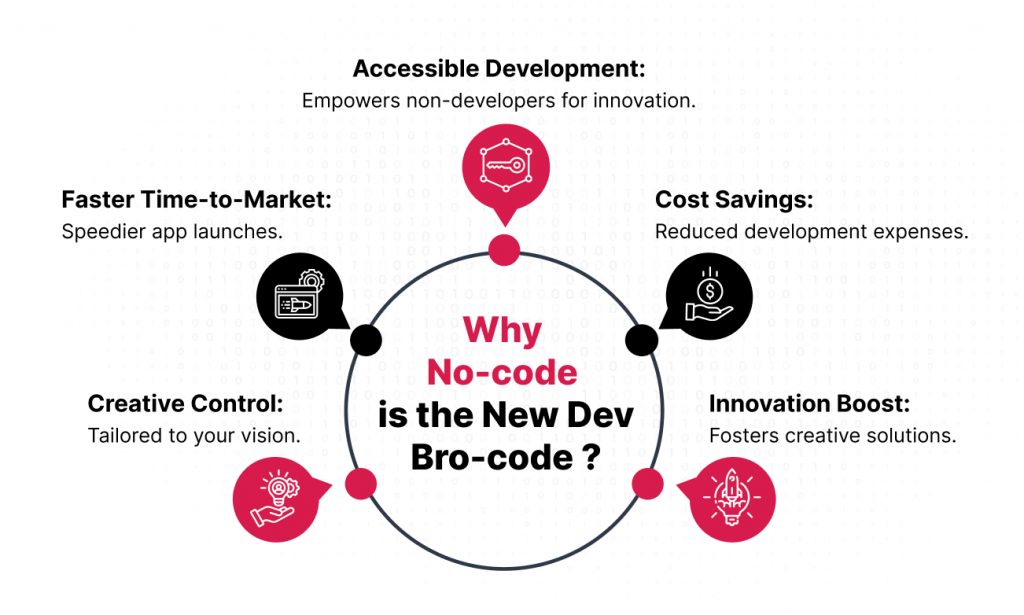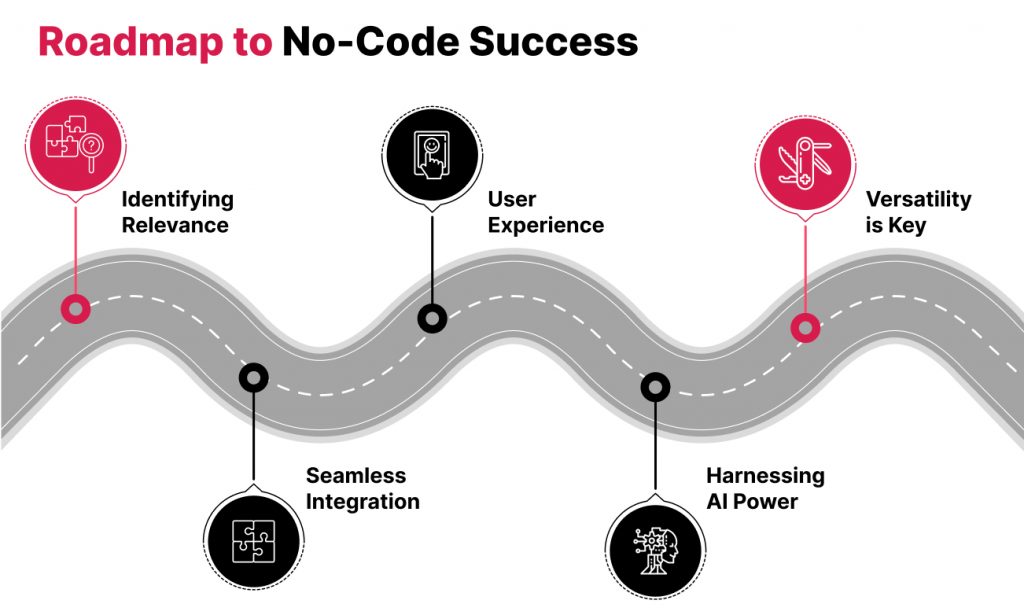In today’s fast-paced digital landscape, software development is experiencing a democratizing shift, expanding its reach beyond specialized programmers to include a broader spectrum of individuals. Market predictions underscore this transformative moment.
Estimates by Emergen Research suggest that by 2028, the no-code market will surge to an impressive $68.05 billion (about $210 per person in the US). On the other hand, as per Growth Market Reports, the global no-code platforms market (which stood at $12.13 billion in 2021) is projected to index $68.03 billion by 2030. This paradigm shift speeds up the software development process and unlocks a new era of digital innovation driven by a wider community than ever before.
No-Code Platforms and Why Are They the New Dev Bro-code
If you have been anywhere near the buzzing world of software development, the term “no-code” might have piqued your interest. No-code models are sophisticated platforms designed to let users craft and launch applications without writing a single line of traditional code. It bridges those dreams of having a unique software solution and the formidable barrier of intricate programming knowledge.
Think of it like assembling a puzzle. Traditional coding is like crafting each piece of the puzzle from scratch. On the other hand, no code provides you with all the pieces; your role is to assemble them coherently to create the desired picture. This approach democratizes software development and empowers a vast population of non-developers to translate their visions into functioning digital solutions.
For instance, consider the ambitions of a restaurant owner dreaming of a unique loyalty program through an app. The conventional route would mean hiring a developer, explaining the vision, undergoing multiple iterations, and hoping the final product aligns with the original vision. With no-code platforms, this restaurant owner can enter the development world regardless of their tech savvy. They can choose and customize features, design layouts, and deploy their loyalty app, ensuring it aligns perfectly with their vision.
This paradigm shift speeds up the software development process and unlocks a new era of digital innovation. The constraints of technical prowess no longer shackle the digital dreams of many. In the evolving app development landscape, this philosophy – where creative vision takes the driver’s seat over technical limitations – is rapidly becoming the new code among developers and business professionals alike.

Some compelling reasons for the ascent of no-code models include:
- Web and Mobile App Development: Got an idea? Translate it into a functional app. With “no code,” your digital dreams are now tangible, even if coding may feel like Greek and Latin to you.
- Business Process Automation: No-code platforms, like Zapier or Integromat, are modern-day alchemists, converting mundane tasks like onboarding or expense report verification into automated gold.
- E-Commerce and Web Presence: Platforms like Shopify or Wix are the allies of businesses. With their help, you can craft your online castle without knowing the language of the digital realm.
- Data Dashboards and Reports: Platforms such as Tableau and Google Data Studio have emerged as the wizards of the digital age. They give businesses the power to make sense of the vast data oceans, painting a picture that even novices can understand.
- Prototyping and Minimum Viable Products (MVPs): Time is money. No-code platforms are the speedsters of the tech domain, letting startups road-test their ideas in real-world conditions without draining resources.
But why the sudden infatuation with no-code platforms?
That is simple – It is about empowerment, collaboration, swift T2M, intelligent resource allocation, and cost savings.
What Not to Do with No-Code?
While no-code development is undoubtedly a transformative force in the tech industry, it is not a one-size-fits-all solution to every problem. Much like any powerful instrument, it requires thoughtful and responsible usage, with an awareness of hazards that could present themselves.
Venturing into no-code is comparable to embarking on an excursion into uncharted territory: the experience can offer awe-inspiring vistas and invaluable rewards, but it is not without its complexities and risks that one must carefully manage.
First and foremost, let us address the temptation of quick development.
The accelerated pace enabled by no-code platforms can inadvertently lead to hastily rolling out applications, sometimes at the expense of vital quality assurance steps. To draw an analogy, it is like using a cake mix: the simplified process does not mean you can neglect to test if the cake is fully baked. This cautionary note, when translated into the software language, implies that you should still rigorously test the application to ensure it performs well across various devices, meets the users’ needs and expectations, and is devoid of glitches or bugs.
Then comes the challenge of decentralized app creation.
With more people enabled to create, there is a surge in applications popping up everywhere. Imagine a bustling city with buildings springing up without proper urban planning. This can result in apps that need more cohesion with a company’s broader digital infrastructure. This decentralization can also be a breeding ground for shadow IT (Information Technology), bypassing critical security protocols and governance structures and exposing businesses to security threats.
Integration is another factor that demands attention.
In today’s interconnected digital ecosystem, applications do not function in isolation. They are part of a vast network, interacting with various systems. If a no-code platform does not seamlessly integrate with, let us say, your existing CRM or ERP systems, it is like trying to fit a misfit. The result? Disjointed systems and potential inefficiencies.
It is also worth discussing the concept of technical debt.
No-code platforms, with their predefined functionalities, are fantastic for quick deployments. However, as businesses grow and requirements become more intricate, deeper customization might be needed, which could strain the capabilities of a no-code platform. Think of it as starting with a toy car for quick travel, but as you embark on longer journeys, you might need to upgrade to a more robust vehicle.
Finally, data breaches – a persistent concern in today’s digital age.
With the proliferation of applications created through no-code platforms, rigorous security checks are not just recommended; they are imperative, primarily when the application interacts with external stakeholders or involves sensitive data.
In short, while the no-code journey promises unfettered innovation and rapid development, it requires thoughtful navigation. The key lies in balancing the liberating power of no-code with a commitment to quality, security, and integration.
Charting Your Course in the No-Code Realm: How to Get Started?
Dipping your toes into the no-code waters can feel both exhilarating and overwhelming. The plethora of platforms and their expansive possibilities is akin to a kid stepping into a colossal candy store for the first time. Where do you begin? And, most importantly, how do you ensure you get the most out of this transformative technology? Here’s a roadmap to help you navigate:

- Identifying the Relevance: Before diving headfirst, step back and ask, “What am I trying to achieve?” The no-code platform you choose should align perfectly with your business’s specific challenges and future visions. For instance, a retailer looking to establish a digital storefront might lean towards platforms like Shopify, while an entrepreneur aiming to prototype a unique app might gravitate towards Bubble.
- Seamless Integration: In the vast and intertwined web of modern digital tools, the ability of your no-code platform to effortlessly meld with other systems cannot be overstated. Imagine creating a puzzle masterpiece, only to find that one piece does not fit. That is how crucial integration is. Whether it is your CRM system, email marketing tool, or data analytics software, seamless interoperability ensures a harmonious and efficient digital ecosystem.
- User Experience: Even if a platform comes loaded with all features and functionalities, its utility could be better if users find it as incomprehensible as an extraterrestrial dialect. The key to usability is an intuitive user interface complemented by thorough and accessible documentation to ease learning. Take the example of platforms like Zapier, which have built their reputation on straightforward, user-friendly design. This approach enables users to construct workflows quickly, often in just a few minutes, thereby lowering the barriers to entry and promoting widespread adoption.
- Harnessing the Power of AI: We live in an era where AI is reshaping industries. Modern no-code platforms, recognizing this seismic shift, are integrating AI to automate, optimize, and add unprecedented capabilities. Whether it’s predictive analytics, chatbots, or automated customer insights, platforms equipped with AI can supercharge your applications, offering a distinct competitive edge.
- Versatility is Key: The digital needs of businesses are multifaceted. Today, you might need a tool for email campaigns, tomorrow for data visualization, and next week for automating customer feedback. A no-code platform that offers a broad spectrum of tools, spanning design customization to advanced analytics, can be your Swiss Army knife in the digital realm.
The market is awash with choices, each vying for your attention with unique selling points. From Zapier’s vast integration capabilities to Salesforce Lightning’s comprehensive development suite, the options are plentiful. The trick lies in discerning which platform meshes best with your unique requirements.
Remember, opting for the no-code is not mindlessly chasing the latest trend. It’s about strategically leveraging a powerful toolset to elevate your business, innovate faster, and deliver unparalleled value. With the right platform and a clear vision, the digital world becomes your oyster.
Some of the Use- cases of Platforms implementing No-code Technology
- Teachable Machine: An innovative platform focusing on machine learning and AI that allows users to create custom models. They can only do this with understanding and knowledge of coding through the power of AI. It is being able to teach your device camera live in the browser through a neural network.
- Rapid Miner: This is a no-code data analytics and machine learning platform ideal for data pre-processing, modeling, and deployment. It uses an intuitive visual workflow builder to drag and drop data and analyze it further without complex codification. It is ideal for seasoned data scientists and enables collaboration among teams.
- Airtable: This app combines the functionalities of spreadsheets and databases for flexible data organization, collaboration features, and API integrations. Alternatively, this does not have options for setting collaborator permissions at the table, record, and field levels. So all your data is accessible.
- Bubble: Making a visual programming platform for web and mobile applications without coding, enabling drag-and-drop interface, database management, and integration capabilities. They build web apps ten times faster and are more affordable than most.
In this vibrant digital era, no-code platforms are not just tools but transformative powerhouses. They democratize innovation, breaking down the barriers that once limited the creation of digital solutions to a select few. No longer are businesses and individuals bound by their technical know-how. Everyone can craft their digital destiny with no code, from the local baker dreaming of a customized online store to the large corporation seeking streamlined operations. And while the appeal of no-code platforms is undeniably vast, it’s not just about having access to these tools but mastering them.
Read more: Navigating scalable website updates with agility amid constant change and complexity
Harnessing the No-Code Revolution with Robosoft
Enter Robosoft- Our expertise goes beyond merely understanding the no-code movement. We champion and mold it to fit your unique needs and ensure you reap its maximum potential.
Partnering with Robosoft means unlocking doors to rapid innovation, cost efficiencies, and a tailor-made digital trajectory. Our team, seasoned in the art and science of no-code platforms, can guide, mentor, and work alongside you, ensuring that every step in this arena is strategic, sound, and successful.
If you envision a future where your business operates with agility, where digital solutions adapt and evolve in sync with your ideas, and where the digital landscape is navigable and accessible, let’s have a conversation. Together, we can explore various approaches to co-create the future, ensuring to meet your specific needs while considering the benefits of low-code and no-code platforms.





